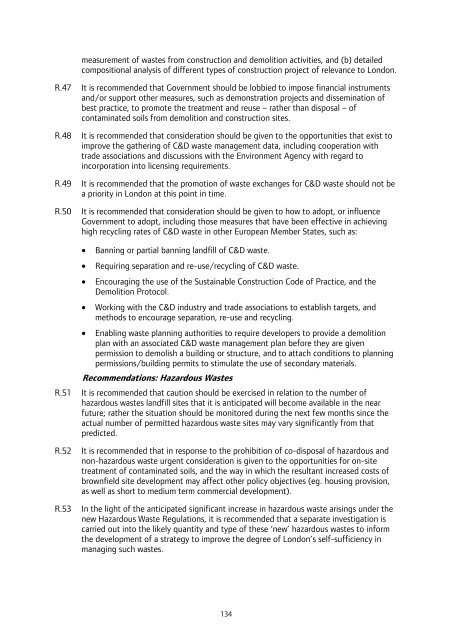London Wider Waste Strategy - London - Greater London Authority
London Wider Waste Strategy - London - Greater London Authority
London Wider Waste Strategy - London - Greater London Authority
You also want an ePaper? Increase the reach of your titles
YUMPU automatically turns print PDFs into web optimized ePapers that Google loves.
measurement of wastes from construction and demolition activities, and (b) detailed<br />
compositional analysis of different types of construction project of relevance to <strong>London</strong>.<br />
R.47 It is recommended that Government should be lobbied to impose financial instruments<br />
and/or support other measures, such as demonstration projects and dissemination of<br />
best practice, to promote the treatment and reuse – rather than disposal – of<br />
contaminated soils from demolition and construction sites.<br />
R.48 It is recommended that consideration should be given to the opportunities that exist to<br />
improve the gathering of C&D waste management data, including cooperation with<br />
trade associations and discussions with the Environment Agency with regard to<br />
incorporation into licensing requirements.<br />
R.49 It is recommended that the promotion of waste exchanges for C&D waste should not be<br />
a priority in <strong>London</strong> at this point in time.<br />
R.50 It is recommended that consideration should be given to how to adopt, or influence<br />
Government to adopt, including those measures that have been effective in achieving<br />
high recycling rates of C&D waste in other European Member States, such as:<br />
• Banning or partial banning landfill of C&D waste.<br />
• Requiring separation and re-use/recycling of C&D waste.<br />
• Encouraging the use of the Sustainable Construction Code of Practice, and the<br />
Demolition Protocol.<br />
• Working with the C&D industry and trade associations to establish targets, and<br />
methods to encourage separation, re-use and recycling.<br />
• Enabling waste planning authorities to require developers to provide a demolition<br />
plan with an associated C&D waste management plan before they are given<br />
permission to demolish a building or structure, and to attach conditions to planning<br />
permissions/building permits to stimulate the use of secondary materials.<br />
Recommendations: Hazardous <strong>Waste</strong>s<br />
R.51 It is recommended that caution should be exercised in relation to the number of<br />
hazardous wastes landfill sites that it is anticipated will become available in the near<br />
future; rather the situation should be monitored during the next few months since the<br />
actual number of permitted hazardous waste sites may vary significantly from that<br />
predicted.<br />
R.52 It is recommended that in response to the prohibition of co-disposal of hazardous and<br />
non-hazardous waste urgent consideration is given to the opportunities for on-site<br />
treatment of contaminated soils, and the way in which the resultant increased costs of<br />
brownfield site development may affect other policy objectives (eg. housing provision,<br />
as well as short to medium term commercial development).<br />
R.53 In the light of the anticipated significant increase in hazardous waste arisings under the<br />
new Hazardous <strong>Waste</strong> Regulations, it is recommended that a separate investigation is<br />
carried out into the likely quantity and type of these ‘new’ hazardous wastes to inform<br />
the development of a strategy to improve the degree of <strong>London</strong>’s self-sufficiency in<br />
managing such wastes.<br />
134
















